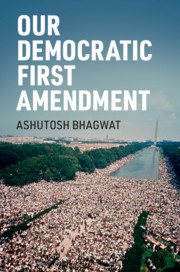Book contents
- Our Democratic First Amendment
- Our Democratic First Amendment
- Copyright page
- Dedication
- Contents
- Acknowledgments
- Introduction
- Part I The Framers’ Democratic First Amendment
- 1 Freedom of Speech and of the Press
- 2 Assembly and Association
- 3 The Petition Clause
- 4 Cognate Rights and Democratic Citizenship
- Part II The Democratic First Amendment in the Age of Twitter
- Index
1 - Freedom of Speech and of the Press
from Part I - The Framers’ Democratic First Amendment
Published online by Cambridge University Press: 28 May 2020
- Our Democratic First Amendment
- Our Democratic First Amendment
- Copyright page
- Dedication
- Contents
- Acknowledgments
- Introduction
- Part I The Framers’ Democratic First Amendment
- 1 Freedom of Speech and of the Press
- 2 Assembly and Association
- 3 The Petition Clause
- 4 Cognate Rights and Democratic Citizenship
- Part II The Democratic First Amendment in the Age of Twitter
- Index
Summary
This chapter explores the historical roots and purposes of the Free Speech and Freedom of the Press Clauses of the First Amendment. It shows that the most of the early conflicts in this area concerned press freedoms. Disagreements over these issues came to a head over the Sedition Act of 1798, which was used by the Federalist Party to jail its Republican opponents. Ultimately, out of this conflict the Republicans articulated a new model of citizenship, rooted in principles of popular sovereignty, which remains central to our system of government today. Freedom of speech, on the other hand, played a very limited role in early history. Regardless of its humble origins, however, the Framing generation agreed that Free Speech, like Freedom of the Press, was an essential element of democratic government. Unfortunately, these rights have often been ignored by our government and the judiciary during times of stress such as the Red Scare and the McCarthy era. Today, however, thanks to the influence of pioneering arguments by Justices Oliver Wendell Holmes, Jr. and Louis Brandeis, there is broad agreement that these rights are essential to democracy and so must be protected.
Keywords
- Type
- Chapter
- Information
- Our Democratic First Amendment , pp. 13 - 42Publisher: Cambridge University PressPrint publication year: 2020

